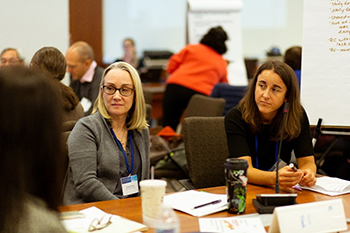EGRP Cancer Epidemiology News
February 2024
- Tips for Contacting Program Directors About NCI Grant Funding
- Funding Opportunities
- Grants Policy Announcements
- Requests for Information
- Job and Training Opportunities
- News and Blog Posts

Tips for Contacting Program Directors About NCI Grant Funding
Who are Program Directors?
NCI program directors (PDs), also referred to as program officers or program officials, provide scientific and administrative stewardship of research grants and serve as points of contact for applicants pre- and post-review. Their duties include:
- Managing a portfolio of grants within a particular scientific area;
- Overseeing programmatic, scientific, and technical aspects of grants;
- Organizing workshops and meetings to evaluate state-of-the-science, identify gaps in the Institute’s research portfolio, and explore opportunities to inform future research;
- Serving as a scientific liaison with other NIH institutes, government agencies, and professional societies; and
- Fostering science through interactions with investigators.
NCI’s Epidemiology and Genomics Research Program (EGRP), in the Division of Cancer Control and Population Sciences (DCCPS), is currently served by more than 20 PDs with training and expertise in a variety of scientific areas, including, but not limited to, clinical and translational epidemiology; environmental epidemiology; genomic epidemiology; the development and validation of laboratory and technical approaches for large human population studies; and methods, tools, and technologies for risk factor assessment.
Those who do not already have an assigned PD are invited to review the EGRP staff list to identify PDs with related scientific responsibilities. If you do not know who to contact in EGRP with specific questions or information requests, please e-mail nciepicommunications@mail.nih.gov.
Contacting a Program Director during the Grant Funding Process
Before applying for a funding opportunity, contact a PD to ask about:
- Funding opportunities, initiatives, and programs in DCCPS;
- Learn about NIH pre-submission policies and procedures;
- Resources available from NIH/NCI;
- Eligibility, mechanisms, and requirements for funding;
- Information on policies or guidelines; and
- Priority areas for an institute, program, or branch.
Remember these tips when reaching out to a PD:
- Always email the PD first to request information or to schedule a phone call to discuss your research idea, application, or grant.
- Send the PD a one-page summary of your distinct aims or an abstract in advance of the call and come prepared with specific questions to ask during the call.
- Calls typically last 15–30 minutes. Sending your project information ahead of time allows you to spend more time asking key questions.
After your grant is reviewed, you may want to talk to a PD about the outcome of the review. Keep in mind that a PD cannot speak with you about the review until after the summary statement is available. The summary statement is usually available 4-6 weeks after the study section meeting is completed.
An award notification typically comes 7-10 months after you apply. After receipt of funding, contact a PD about:
- Your grant funding;
- Changes to your NCI-funded projects (e.g., changes in research aims);
- Carry over funds;
- Grant transfer or closeout; and
- Annual reports.
Additional Resources
To learn more about contacting PDs throughout the NIH grant funding process, visit:
- How to Apply – Application Submission and Review
- Key Contacts and Steps in the Grant Funding Process (PDF)
- How to Talk to an NCI Program Director to Begin Your Funding Application Preparation
 (Video)
(Video) - DCCPS Funding Opportunities
Funding Opportunities
- PAR-24-122, Modular R01s in Cancer Control and Population Sciences (R01, Clinical Trial Optional)
- International Research Scientist Development Award (IRSDA) (K01, Independent Clinical Trial Not Allowed)
- PAR-24-117, The NCI Transition Career Development Award (K22, Independent Clinical Trial Optional)
- NOT-CA-24-030, Notice of Special Interest (NOSI): Administrative Supplements for Contemporary Modifiable Exposures and Cancer Across the Life Course and Cancer Control Continuum
- NOT-CA-24-031, NOSI: Validation of Digital Health and Artificial Intelligence/Machine Learning Tools for Improved Assessment in Biomedical and Behavioral Research
- NOT-CA-24-028, NOSI: Administrative Supplements for NCI Global Oncology Mentored Research
- NOT-CA-24-027, Notice of NCI’s Participation in PAR-23-319, Implementation Research on Noncommunicable Disease Risk Factors among Low- and Middle-Income Country and Tribal Populations Living in City Environments (R01, Clinical Trial Optional)
Grants Policy Announcements
- NOT-OD-24-057, Guidance on Salary Limitation for Grants and Cooperative Agreements FY 2024
- NOT-OD-24-055, NIH Enforcement of Unilateral Closeout Reporting in the System for Award Management Responsibility/Qualification (formerly Federal Awardee Performance and Integrity Information System (FAPIIS)
- NOT-OD-24-059, NIH Operates Under a Continuing Resolution
- NOT-OD-24-061, NIH Guidance on Marking Changes in Resubmission Applications
Requests for Information
- Cancer Genomics Survey Invitation
- NOT-CA-24-021, Current Capabilities in Automated Data Entry and Extraction from Electronic Health Records (responses due by February 29, 2024)
- NOT-RM-24-001, Increasing the Usability of Common Fund Data Resources by Researchers from Underrepresented Groups (responses due by February 29, 2024)
Job and Training Opportunities
- Fellowships in Genomic Epidemiology and Clinical & Translational Epidemiology
- Chief, Healthcare Assessment Research Branch, Healthcare Delivery Research Program (please submit letter of interest and CV by April 1, 2024)
- Chief, Statistical Research and Applications Branch, Surveillance Research Program
News and Blog Posts
- 275 Million New Genetic Variants Identified in NIH Precision Medicine Data
- NIH Launches Research Network to Evaluate Emerging Cancer Screening Technologies
- NIH Director Statement on Catalyzing the Development of Novel Alternative Methods
- Can Some People with Breast Cancer Safely Skip Lymph Node Radiation?
- What Happens If More People Get Screened for Cancer?
- 2023: A Year in Review
Stay Connected
Subscribe for Updates

Subscribe
You can subscribe and unsubscribe at any time by entering your email address and selecting your preferences on the page that follows.
Need Help?
EGRP staff can answer questions on grant funding, policies, and research resources. If you do not know who to contact we will do our best to connect you with someone who can help you.
Email Us(240) 276-6730